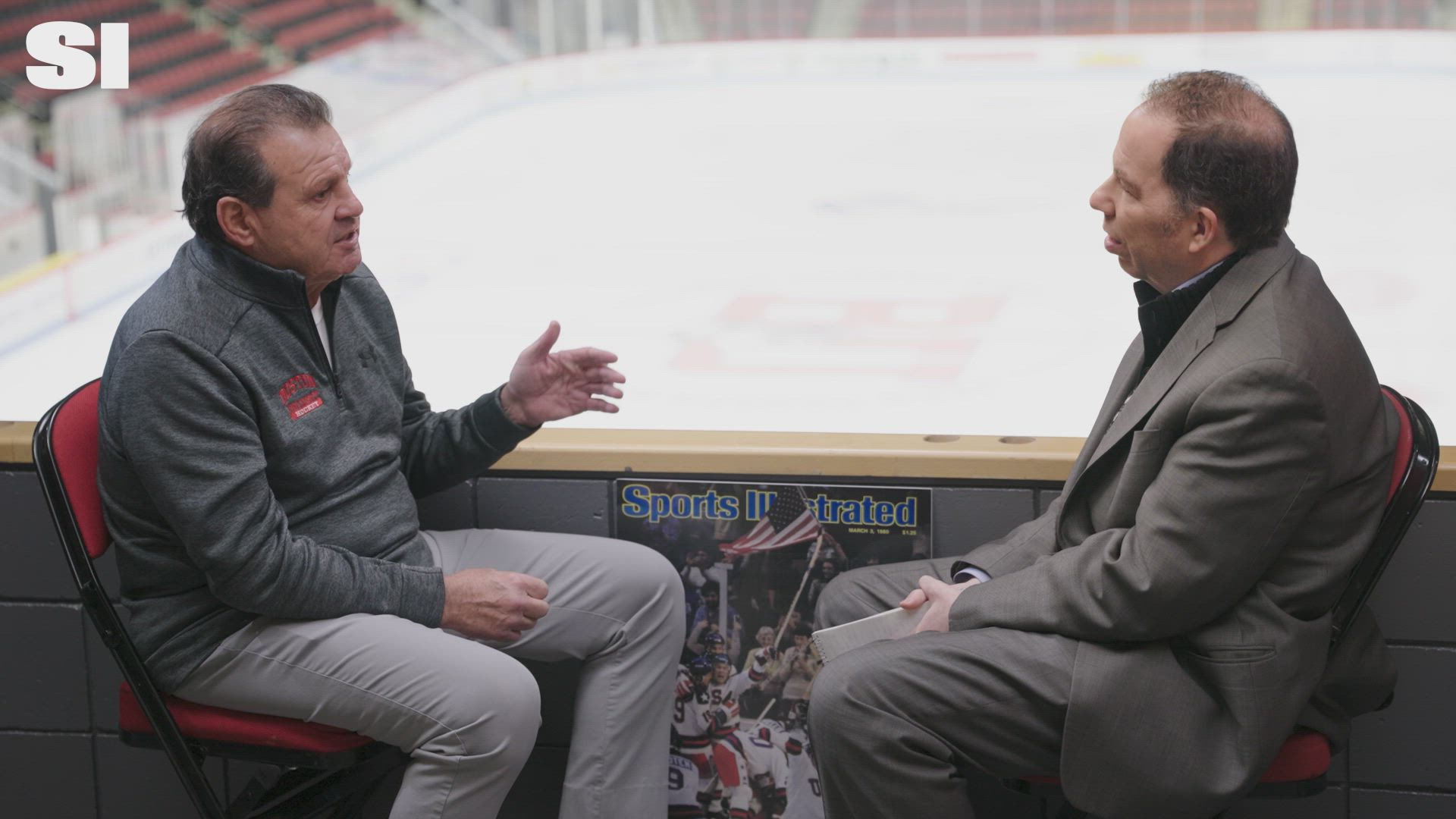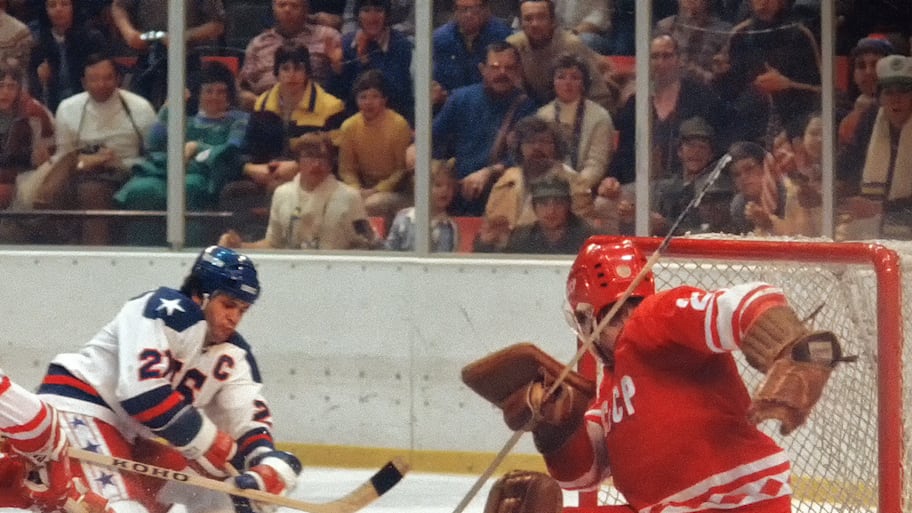Mike Eruzione’s iconic goal in the famed Miracle on Ice game at the 1980 Olympics in Lake Placid turned the hockey world upside down. So it was only fitting that Eruzione should keep a similar posture when, 10 days later, he appeared on Sports Illustrated’s March 3, 1980 cover celebrating the victory with his teammates.
The euphoria after the U.S. team’s unlikely 4–3 victory against the Soviets set off celebrations around the country, but they started on the ice at the Olympic arena. The late Heinz Kluetmeier’s extraordinary cover photo—the longtime photographer’s favorite image among the millions his cameras produced—depicted hugs and player piles. It caught U.S. defenseman Jack O’Callahan with arms raised over a prone teammate Mike Ramsey, raising his own arms in celebratory supine. But where, among that mayhem, was Eruzione, the team captain?

“That is my leg,” says Eruzione today, eyeing a two-foot-tall poster-sized version of the cover and pointing to a lifted limb in its lower right corner. “If I’d known they were taking the picture, I’d have stood in front of Jack. I’d have jumped up.”
Kluetmeier’s image so expertly reflected the moment that to this day, it remains the only time SI ever printed a cover without explanatory text. “You didn’t need it,” Kluetmeier said in 2015. “I’ve never seen so much emotion, so much joy, in any photo I ever took. That’s why it was my favorite.”

In December 1980, SI repurposed the photo, awarding the U.S. Olympic hockey team with its Sportsmen of the Year honor. The title to E.M. Swift’s story in that issue was: A Reminder of What We Can Be.
And in 1999, SI bestowed another honor on the team, calling the unlikely U.S. victory the greatest sports moment of the 20th century. It was a happening that resonated with sports fans and non-sports fans, with young and old, with Olympic devotees and neophytes, from across the country, who all saw it as more of an inspirational tale than a standalone event.
“People come up to my today, depending on their age, and they tell me: ‘I remember where I was on D-Day, when the challenger blew up, [when] Kennedy [was shot]; 9/11; and I remember where I was when we won,” Eruzione says. “So many of those memorable moments were tragic moments. But ours, that was something positive. If you’re only going to mark time by negative events that took place in your life, it’s great to have one that makes you smile and gives you hope.”
People across the country wanted to savor it. At a time of soaring inflation, long gas lines and U.S. hostages being held for a year in Iran, this was therapy. Broadway shows paused mid-acts so patrons could sing the national anthem. Nurses in an intensive care unit in Miami wheeled a TV in front of gunshot victims to distract them from the peril they faced. Flag sales increased. Bars and delis named drinks and sandwiches for Eruzione, Jim Craig, Neal Broten (“The Broten Bratwurst”) and others. Said SI’s Swift: “It just made you want to pick up your television set and take it to bed with you. It really made you feel good.”

Eruzione was the 25-year-old Boston University alumnus who had spent three intervening years unable to crack an NHL lineup and land a pro contract. If he had, his timely Olympic heroics would never have happened.
In the year leading up to the Olympics, U.S. coach Herb Brooks drove his players, short on talent, long on grit, to their breaking points. After a disappointing tie in an exhibition game against the Norwegian national team in Oslo, Brooks famously skated his charges in hard sprints for 45 minutes until they threw up and collapsed on the ice after the rink manager had turned off the lights.
In the U.S.’s team final pre-Olympic exhibition game, they dropped a 10–3 decision to the Soviets in Madison Square Garden. The score seemed to reflect the relative talents of the teams and the U.S. chances to challenge the Soviets in Lake Placid. Eruzione did score one of the three U.S. goals, snapping a wrist shot off his wrong foot. That was nice, but it was surely a one-off moment, never to be repeated.
Three days later the U.S. tied Sweden in the final minute of its opening Olympic contest and won all six subsequent games. Those frequent extra sprints—the players called them “Herbies”—gave the young U.S. players a conditioning advantage. In Lake Placid, only once in seven contests did the U.S. score the opening goal, yet the team outscored foes by a cumulative 16-3 during the third periods.

Thanks to their strong showing in preliminary games, the U.S. qualified for the medal round, taking on the Soviets and Finns. After all-world Soviet goaltender Vladislav Tretiak gave up a weak goal to Mark Johnson in the final second of the first period, Soviet coach Viktor Tikhonov shockingly replaced Tretiak with back-up Vladimir Myshkin for the rest of the match.
It was left to Eruzione, the captain whose Italian name means eruption, to create the biggest one of all in Lake Placid. With the score tied, 3–3, in the third period, Eruzione picked up a loose puck in the Soviet zone. Skating to his right, the left-handed shot fired a wrist shot under the screen of defenseman Vasily Pervukhin and then Myshkin. It was nearly identical to the one he’d scored two weeks earlier in Madison Square Garden.
“I didn’t think it would go in,” Eruzione recalls. “My initial thought was that I pulled it, shooting off the wrong foot. As Myshkin dropped to the ice late, the puck flew past him into the goal with exactly ten minutes left in the third period. “I didn’t see the puck go in until I saw the fans behind the net jump up in the air,” Eruzione says. “Three inches to the left and I’d be painting bridges.”
Instead, the U.S. survived the final ten minutes and topped Finland, 4–2, two days later to secure the gold medal. “It changed my whole life,” Eruzione says.

The captain returned to his hometown of Winthrop, Mass., resolved that at 25, his hockey career was finished. “There’s no way I could ever play games that could mean as much to me as those,” he says. “I didn’t want to be remembered as a guy who played in the NHL a bit, got sent to the minors and faded out of the picture. I wanted to be remembered as the captain of our Olympic team that won a gold medal.”
Off the ice for good, Eruzione soaked up a lifetime of opportunities. He was an advisor on two feature length films about the team: Miracle on Ice in 1981 and Miracle in 2004. He became a regular guest at banquets and golf tournaments. He graced phone book covers, received marriage proposals and did commercials. He was commissioned by Budweiser to paint posters with sticks, skates and pucks, proclaiming in his New England patois, “I’m Mike Eruzione, the ahhh-tist . . . Remember, there are a lot of Picassos, but there’s only one Eruzione.” And who else could claim to throw out first pitches for both the Red Sox and Yankees?
Though the invitations have abated, they haven’t disappeared. In February, Eruzione served as honorary captain for the U.S. team at the Four Nations Tournament. At 70, he still works as director of special outreach for Boston University, his alma mater that reached the NCAA championship game in March.
Even miracles have afterlives.
This article was originally published on www.si.com as Mike Eruzione Revels In Team USA’s Miracle on Ice Moment That Turned the World Upside Down.
